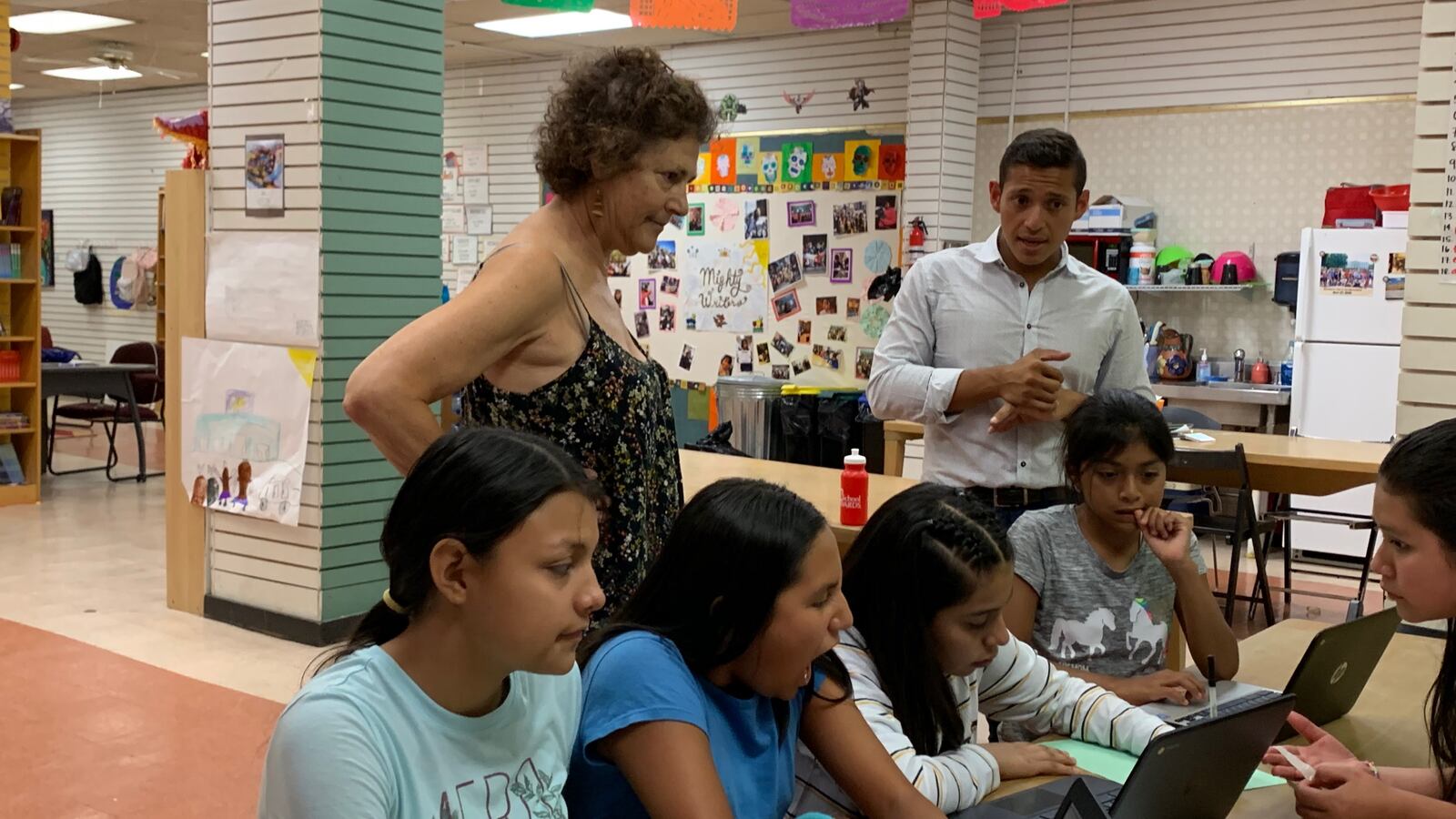This article was originally published in The Notebook. In August 2020, The Notebook became Chalkbeat Philadelphia.
Miguel Martinez-Valle, a reporter from NBC and Telemundo, spent a recent week at the Mighty Writers site known as El Futuro to show a group of 11- to 13-year-olds how to report, organize, and write a news story.
He helped them do original interviews, showing them how to set up the camera and ask questions. They studied and edited the clips, got the necessary follow-up shots, and worked together on intros and “outros,” or wrap-ups.
Each student was able to practice roles such as cameraman, producer, and reporter while creating a script and planning as a group for their interviews.
“This is a super young immigrant community,” said Martinez-Valle. “Their aunts and uncles own a lot of shops around here, and so it’s important for them to be able to report and talk about their communities.”
For the last 10 years, Mighty Writers has been providing free instruction for children to help them improve their writing. The programs offered at the seven centers, including one in Camden, NJ, are specific and centered on a particular genre and style. The organization brings in volunteers from groups including the Peace Center, based in Langhorne, which has a mission to reduce violence in society. The center works on issues from bullying to the border detentions of immigrant children.
These organizations often partner with the specific community that the site serves, and in return, the students get exposed to a new style of writing and to a profession they may not have had on their radar before.
“They [Telemundo] want to reach that [Latinx] audience,” said Nelia Diaz, program director. “They want to get that content, and we get to see what they have to offer [in return].”
“What’s interesting about Mighty Writers is that they’re sited in needy communities in terms of literature,” said Sandee Mandel, a retired teacher and a Mighty Writers volunteer. “This is a wonderful program to supplement the learning in Philadelphia schools.”
Each site involved with Mighty Writers is different. Some of its programming is generic, but for the most part each location offers specific programs relevant to its own community.
“[Each of these sites] reflect[s] the communities that they exist in,” said Mandel.
A mural at the El Futuro site of Mighty Writers. It says, “I dream of an afternoon in the future.”
El Futuro itself is a special site, even within Mighty Writers. Located in the Italian Market area around Ninth and Washington in South Philadelphia, it caters to the Mexican immigrant population in the area. It is the only Mighty Writers site that is bilingual, and students also learn about Mexico and Mexican culture.
“Mighty Writers helps us to learn stuff like the numbers and what is Mexico,” said Mabelline, 7. “We learned how to talk different languages and 10 minus 5, and we tell stories.”
Said her friend Briana: “We learn about Mexico – what they do there, what they have there, and we learn about the food. We learned that they have horses there, [and] that they have very different foods.”
Diaz regularly uses connections like Telemundo to enhance what is available at El Futuro’s site. The week that the Peace Center volunteers came in, the theme was bullying. And programming is year-round. Drexel and Temple Universities have found ways to support their programs, including the Academy, a program that helps students with homework and provides writing support four times a week during the school year.
“Kids need so much help, and the school doesn’t provide so much,” Diaz said. “It’s a real issue, and unfortunately they don’t have [sufficient] support in Philadelphia schools.”
Over its history, Mighty Writers has grown considerably. Starting in 2009 with about 100 students, there were 1,300 in the summer camp program this year. Despite increasing capacity at its sites by about 500 students, Mighty Writers was still not able to accommodate all the students who applied this year.
Diaz notes that in the case of the El Futuro site, the issue is having enough space. She said she rotates different age groups week by week to give everyone a chance to participate.
The yearlong writing support that the program provides is crucial, she said.
“They’re glad for this chance,” said Diaz. “The immigration that’s happening, they’re looking for programs where they can speak English.”
However, Diaz notes that El Futuro does not really appeal to people outside of the Latinx community in South Philadelphia, which now includes immigrant families from all over the world, including Asia and Africa. Therefore, she believes that El Futuro’s popularity had to do more with people talking favorably about the program to friends and neighbors.
Advertising is limited, she said. “It’s all more word of mouth.”
Although Mandel has volunteered at multiple Mighty Writers sites, including Mighty Writers West, she finds El Futuro to be special.
“I’ve seen little shy kids come alive, I’ve seen camaraderie happen, I have seen kids from the same culture come together,” she said. “It’s such a fascinating place.”

